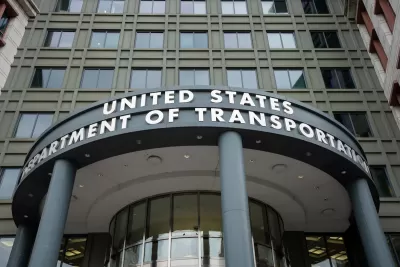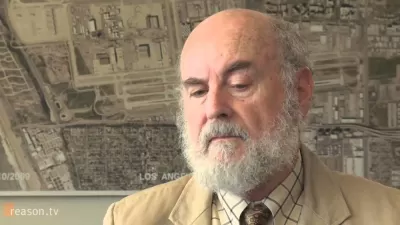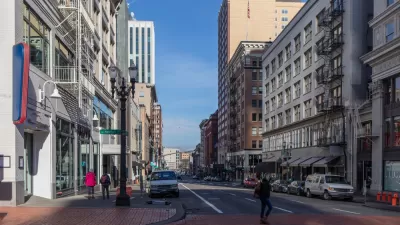USDOT employees, who are required to go back to the office, will receive free parking at the agency’s D.C. offices — flying in the face of a growing research body that calls for pricing parking at its real value.

In a nod to the late, great Donald Shoup, Kea Wilson argues that the U.S. Department of Transportation’s free parking initiative will “encourage driving by employees who otherwise would take transit — and inflict more congestion, emissions, and traffic violence on surrounding communities.”
Parking spots at the USDOT’s Washington office that once cost $155 per month will now be free and distributed through an annual lottery — including spaces once reserved for people with disabilities, carpoolers, and people who use their vehicles for work. “That policy, which may violate federal law, also runs runs counter to the District's own policies to encourage more sustainable commuting and curb the deleterious effects of cars in the nation's dense, transit-rich nation's capital,” Wilson asserts.
According to Daniel Herriges of the Parking Reform Network, “There are a handful of places in North America that basically would cease to function if everybody who works there drove in every day ... and I would say that the core of Washington, D.C. is absolutely one of those places.”
Although a 2022 law mandates that D.C. employers with over 20 employees provide parking cash-outs to employees who don’t drive to work, companies and organizations with their own parking lots, like USDOT, were exempt — “removing a powerful incentive for employers in transit-rich neighborhoods to stop offering parking to anyone and putting their lots to more productive use.”
FULL STORY: The High Cost of Free Parking: Duffy’s Parking Giveaway Will Cost the Rest of America

Alabama: Trump Terminates Settlements for Black Communities Harmed By Raw Sewage
Trump deemed the landmark civil rights agreement “illegal DEI and environmental justice policy.”

Planetizen Federal Action Tracker
A weekly monitor of how Trump’s orders and actions are impacting planners and planning in America.

The 120 Year Old Tiny Home Villages That Sheltered San Francisco’s Earthquake Refugees
More than a century ago, San Francisco mobilized to house thousands of residents displaced by the 1906 earthquake. Could their strategy offer a model for the present?

Opinion: California’s SB 79 Would Improve Housing Affordability and Transit Access
A proposed bill would legalize transit-oriented development statewide.

Record Temperatures Prompt Push for Environmental Justice Bills
Nevada legislators are proposing laws that would mandate heat mitigation measures to protect residents from the impacts of extreme heat.

Downtown Pittsburgh Set to Gain 1,300 New Housing Units
Pittsburgh’s office buildings, many of which date back to the early 20th century, are prime candidates for conversion to housing.
Urban Design for Planners 1: Software Tools
This six-course series explores essential urban design concepts using open source software and equips planners with the tools they need to participate fully in the urban design process.
Planning for Universal Design
Learn the tools for implementing Universal Design in planning regulations.
Clanton & Associates, Inc.
Jessamine County Fiscal Court
Institute for Housing and Urban Development Studies (IHS)
City of Grandview
Harvard GSD Executive Education
Toledo-Lucas County Plan Commissions
Salt Lake City
NYU Wagner Graduate School of Public Service




























